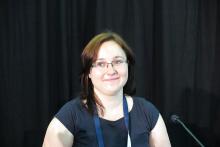MADRID – For patients with relapsed or refractory B-cell precursor acute lymphoblastic leukemia (BCP-ALL), an extensive and diverse T-cell receptor repertoire may be predictive of response to blinatumomab (Blincyto), investigators suggest.
Patients with responses to blinatumomab had a significantly more diverse T-cell receptor–beta (TRB) gene repertoire at the time of screening, compared with patients who would go on to have minimal residual disease after starting on blinatumomab therapy, reported Michaela Kotrova, MD, from the 2nd Faculty of Medicine Charles University and University Hospital Motol in Prague, Czech Republic.
“The diversity of T lymphocytes is really important for the type of immune system against leukemia,” she said at a briefing at the annual congress of the European Hematology Association.Blinatumomab is a bispecific T-cell engager designed to direct cytotoxic T cells to cancer cells expressing the CD19 receptor. Although it can induce high remission rates in patients with relapsed/refractory BCP-ALL and has been shown to nearly double overall survival among patients with relapsed/refractory BCP-ALL negative for the Philadelphia chromosome, about half of patients do not achieve a minimal residual disease response. This finding prompted the investigators to determine whether differences in the TRB repertoire could have an effect on individual patient responses to blinatumomab.
They performed next-generation sequencing of immunoglobulin and T-cell receptor gene rearrangements to evaluate the diversity of the repertoire, which can have a profound impact on health.
Dr. Kotrova noted that, in young people, there may be as many as 120 million different TRB gene rearrangements, and the more the merrier because a higher diversity repertoire is capable of protecting people from a large variety of pathogens.
They compared the diversity of the TRB repertoire in 114 patients who were either responders to blinatumomab salvage therapy or who had measurable minimal residual disease (persisters).
They found that there was significantly greater probability than mere chance that the TRB repertoire before blinatumomab administration was more diverse in patients with responses, compared with those without responses.
On day 15 of the first cycle of blinatumomab therapy, there was no significant difference in TRB repertoire between responders and persisters, but, by day 29, there was a sharper and statistically significant increase in repertoire diversity but no significant increase among nonresponders.
Their findings raise the intriguing possibility that response to blinatumomab could be predicted by repertoire diversity prior to the start of therapy, but further studies with larger patient cohorts will be necessary to confirm this, Dr. Kotrova said.
The study was supported by Amgen. Dr. Kotrova had no relevant disclosures.


